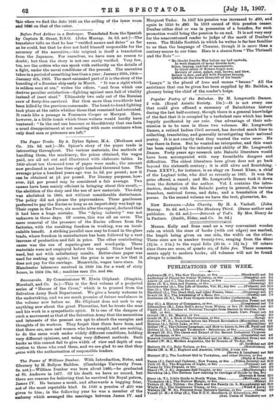The Poems of William Dunbar. With Introduction, Notes, and Glossary
by H. Bellyse Baildon. (Cambridge University Press. 6s. net.)—William Dunbar was born about 1460,—he graduated at St. Andrews in 1477. Of his death we have no record, but there are reasons for believing that he survived his Royal patron, James IV. He became a monk, and afterwards a begging friar, not of the most reputable kind. In 1500 a pension of £10 was given to him ; in the following year he was a member of the embassy which arranged the marriage between James IV. and
Margaret Tudor. In 1507 his pension was increased to 420, and again in 1510 to £80. In 1613 record of • this pension ceases. Dunbar either died or was in possession of a benefice, for such promotion would bring the pension to an end. It is not very easy for the unaccustomed reader to judge of the merit of Dunbar's verse. The Middle Scottish in which he writes is far less familiar to us than the language of Chaucer, though it is more than a century nearer to our time. Here is a stanza from "The Thrissell and the Rois " :—
" Me thocht fresche May before my bed upatude, In weld depaynt of mony diverse hew, Sober, benyng, and „full of mansuetude, In brych atteir of flowers forgit new, Hevinly of color. OuhYt, reid, brown, and blew, Balmit in dew, and gift with Phoebus temysa, Qwhile all the hours illumynit of his lemys."
"Lemys " is the plural of leme and means "beams." All the assistance that can be given has been supplied by Mr. Baildon, a glossary being the chief of the reader's helps.






































 Previous page
Previous page